SHAPING LEADERS FOR A SUSTAINABLE FUTURE


SHAPING LEADERS FOR A SUSTAINABLE FUTURE

Cork University Business School is committed to providing a dynamic and supportive learning and research environment, which recognises the diverse backgrounds and interests of both students and staff.
The mission of Cork University Business School is a commitment to disciplinary strengths and organisational and international engagement. We develop the capacities of students, professionals and organisations through high-impact experiential learning and effective practice-oriented research.
The Vision of Cork University Business School is to be a nationally and internationally recognised business school, known for the excellence of the student learning experience and for the impact of our research on business and society.
Cork University Business School University College Cork, Ireland,
T12 K8AF
P: 021 490 3880
E: business-school@ucc.ie
W: cubsucc.com
CUBS gratefully acknowledges Professor Thomas C. Lawton, Mr Thomas McCarthy, and UCC Academy for the production of this report.
Business insight and analysis are critical in dealing with global challenges.
We have experienced another year of uncertainty and volatility, with climate change at the fore, the war in Ukraine highlighting the interdependence of our economic fortunes, and the supposedly inevitable growth of the technology sector being challenged.
Future leaders, locally and globally, must possess the capabilities to engage and interrogate the business environment and marshal data to support decision-making and organisational sustainability at every level.
As educators and researchers, our role is critical to nurturing graduates and shaping leaders that can adapt to changing environments and deliver organisational and societal change.
This report reinforces our desire to become Ireland’s leading hub for sustainable business education by showcasing our shared success and highlighting the growth and relevance of Cork University Business School at University College Cork. This is reflected in our staff, students and our myriad research, industry, and social partnerships at home and abroad.
As Dean of Ireland’s largest business school, with over 4,000 students, I am excited by the
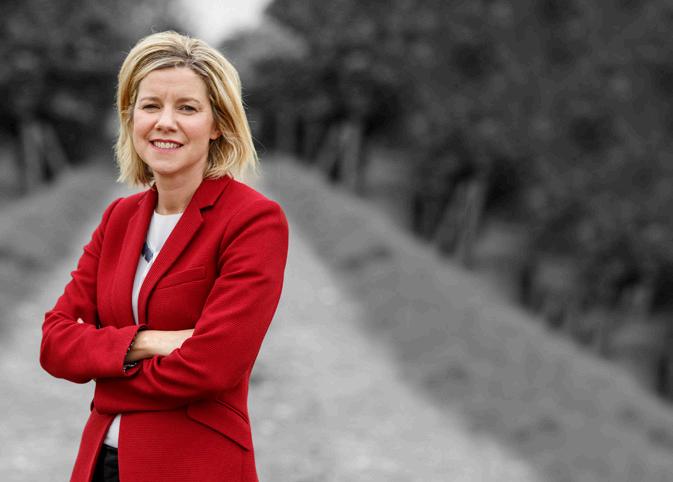
opportunities ahead. We have an ambitious future planned as the design for our new standalone Business School in the heart of Cork’s financial district is complete. We will have a facility that will match our world-class business education, initially accommodating 4,500 students and 225 staff.
While this annual report celebrates our achievements over the last year, we hope you will join us in looking to the future and forging the relationships and collaborations that will strengthen us all.
Professor Thia Hennessy
Dean of Cork University Business School, University College Cork
“Our role is critical to nurturing graduates & shaping leaders that can adapt to changing environments and deliver organisational and societal change.”
These stories of shared successes reflect the journey and efforts of CUBS staff and students, working together to create opportunities that recognise the combined work of everyone at Cork University Business School (CUBS).

We are delighted CUBS had two accreditation success stories in the past year. Both successes enhance the value of the educational experience for students and their opportunities post-education.
Cork University Business School (CUBS) and the Irish Management Institute (IMI) at University College Cork (UCC) obtained AACSB (the Association to Advance Collegiate Schools of Business) accreditation, placing them among the world’s leading business schools. CUBS has now been accredited by the AACSB and AMBA (Association of MBAs), making it a double accredited Business School, of which there are fewer than 200 worldwide.

“A world-leading business school
for Cork is a further step closer. The development of this school will enhance our city and our region, and this accreditation connects CUBS with over 900 business schools throughout the world, putting UCC and Cork at the centre of a global network of internationally renowned experts,” commented Professor John O’Halloran, President of UCC.
“Every year, nearly 1,000 students graduate from CUBS to embark on professional careers. Incredibly, 95% find immediate employment. Our graduates are in
demand as we develop them to be industry ready. Securing this accreditation is evidence of the quality of our education, and we are excited for the next chapter,” enthused Professor Thia Hennessy, Dean of CUBS.
Together CUBS and the IMI deliver fully accredited business and management education through a wide range of programmes that offer a complete lifelong learning pathway from the undergraduate level through to executive education.
Cork University Business School’s Human Resource Management programmes have been re- accredited by the Chartered Institute of Personnel and Development (CIPD), an association with over 160,000 members worldwide.
The CIPD has re-accredited the MSc Human Resource Management and the Higher Diploma in Human Resource Management at CUBS following a rigorous re-accreditation process. Students can now benefit from a course delivered by internationally renowned faculty and senior HR professionals and when graduating, students are eligible to apply
for Associate Membership of the CIPD, with an opportunity to upgrade to Chartered Membership depending on their experience.
CIPD accreditation enhances the degrees awarded by both programmes, as graduates will enter the workforce with a core knowledge that has been collaboratively developed by CIPD members, business leaders, industry experts and partner organisations.
Given CIPD’s size and global reach, membership can help raise the profile of CUBS HR graduates and open doors to new job opportunities.
Cork University Business School continues to identify and celebrate exceptional student performances in the following ways:
The Dean’s Scholar List was introduced in 2018/19 and is an initiative to recognise the academic brilliance of top-performing CUBS students. Compiled annually, the exclusive list is made up of students who are the best performers during their third year, from each of the CUBS undergraduate programmes.
CUBS Leaders of Tomorrow Award Programme aims to recognise the positive (non-academic related) impact and performance of CUBS students as they complete their degree at UCC. Students enrolled in a taught CUBS programme (undergraduate and postgraduate) can submit to the awards scheme with the possibility of attaining a Recognition
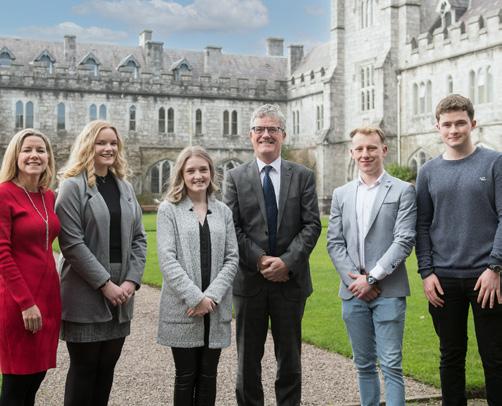
Certificate, Outstanding Achievement or a Sustained Impact award. The initiative will provide opportunities
for students to showcase their many capabilities and levels of impact across six categories - Innovation, Global
Citizen, Learning Transformation, Exceptional Journey, Student’s Choice, and Dean’s Leadership.
In 2022, CUBS launched a new international business programme that prepares students to play a leading role in shaping the post-Brexit, post-COVID-19 global economy.
The BSc International Business with languages (French, German, Irish, Italian or Spanish) programme is specifically designed in response to the need for stronger foreign language and international business skills in the Irish workforce. Employers need graduates who can not only communicate effectively in new markets, but also have the cultural awareness and technical business skills to lead international projects.
The four-year BSc International Business with Languages programme combines comprehensive business education with the study of a language and culture, including an immersive year studying abroad at a partner university in Europe. This qualification provides graduates with the cultural intelligence and skills to work with companies seeking to develop new export markets in the wake of Brexit and the changing dynamics within Europe.
According to Dr Declan Jordan, Programme Director, the elevation of Irish to an official language of the EU
is an example of how cultural intelligence can play a role in shaping policy. He notes that “to be employed in an EU body requires proficiency in at least two official EU languages, to progress requires fluency in three. As Irish is now an official EU language, a career within the EU is now open to a greater number of Irish people.”
The new programme offers Irish as a language pathway, opening up the potential for Irish graduates to avail of opportunities in EU institutions. “PostBrexit, more Irish voices at policy-making levels in the EU will benefit Ireland hugely,” he claims.
To successfully influence future trade, environment, and finance policy, the next generation of Irish representatives will need to strike new alliances and deals with nations that have very few historic ties with Ireland. CUBS continues to prepare these future leaders and decision makers by adapting and creating courses that are relevant and address the current needs of the economy and society.
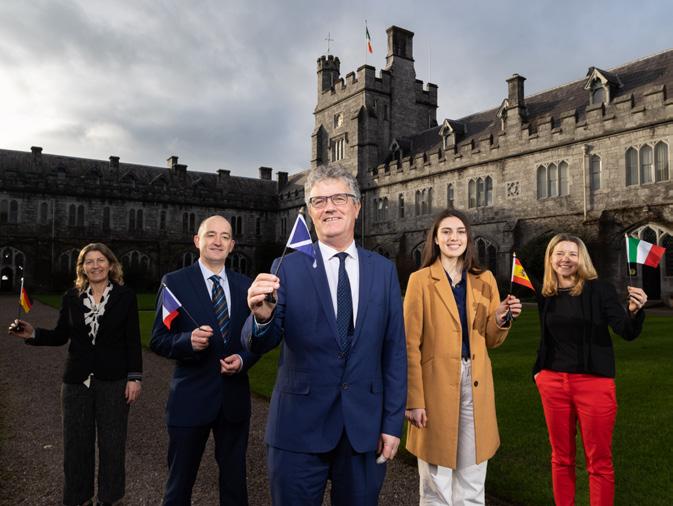
Our students, our future leaders, are the focus of our efforts, and we are delighted that Cork University Business School and UCC can support students through the range of opportunities on offer, enabling each student to reach their maximum potential.

Sumeet Bhattacharjee leverages the CUBS MSc in Food Business and Innovation to unleash his potential.

With ten years of professional experience under his belt, Sumeet Bhattacharjee enrolled in the MSc in Food Business and Innovation programme at Cork University Business School to develop the skills that would set him apart in his quest to become an international brand manager.
Originally from Mumbai, Sumeet came to CUBS determined to obtain new and innovative skills to complement his industry knowledge and expertise. Suitably impressed with his background and focus, CUBS awarded Sumeet a scholarship to allow him to pursue his ambitions.
In 2020, Sumeet was researching universities and educational programmes online and discovered that UCC ran innovative master-level programmes that interested him. The MSc Food Business and Innovation programme, in particular, appealed to Sumeet. The combination of the course content, group and individual projects, and an industry internship meant that Sumeet had found a course at CUBS suited to his ambitions.
For his internship, Sumeet worked for the marketing manager of a food ingredients company. He valued
the practical experience and knowledge he gained during his internship, tasked with solving real brand problems in real-life situations.
One of Sumeet’s key highlights at UCC was being part of the diverse community of students at CUBS. He believes the unique environment at CUBS creates a conducive atmosphere for intense learning, challenging him to push himself to his full capability.
Outside of UCC, Sumeet has become very attached to Cork and Ireland. From experiencing new food and restaurants to historical architecture and scenery, Sumeet has enjoyed and benefitted from his time in Cork.
“Of all the different programmes and opportunities that I had researched, the MSc in Food Business and Innovation really struck me as being different.
Because it is industry inspired, the master’s balances the academic and practical elements of the programme perfectly.”
We are proud of the student entrepreneurs for whom CUBS has been part of their journey. Some students started their entrepreneurial journey well before coming to CUBS. In contrast, others emerge while at CUBS, making the most of the opportunities at our school and through UCC’s incubation programme at IGNITE.
In 2020 the grand champion of the Global Student Entrepreneur Awards was Nick Cotter, co-founder of Cotter Agritech which specialises in targeted treatment systems for sheep.


The awards are open to students who own and operate a business while attending college or university. Nick started his first business aged 13 and has continued to develop his entrepreneurial spirit while studying Law and Business at CUBS.

The Sunday Independent recently identified ‘30 under 30: The young guns of Irish business aiming high’. Cork University Business School was well represented with Emma Coffey, current CUBS student and Marion Cantillon, CUBS Alumna.

Emma was listed for her company Final Bend, which produces activewear that is fun and sustainably made and priced. Emma is currently studying on our BComm programme, and she is one of our CUBS Leaders of Tomorrow.
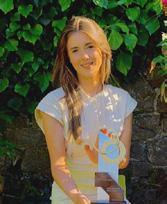
Marion was listed, for her company Pitseal, which was founded on the UCC IGNITE programme with the ‘aim to make farming more eco-friendly and provide long term sustainability for the farmers and their families’ through the provision of eco-friendly solutions for covering silage.

When Annie Madden and her sister Kate were young teenagers, they set up their company FenuHealth. This company received recognition from its early presentation at the BT Young Scientist competition 2015 and has gone from strength to strength since then.
In 2022, Annie won the Entrepreneur of the Year award from Enterprise Ireland for FenuHealth. We add our congratulations and support to Annie and Kate in the continued development of their company while studying at CUBS.
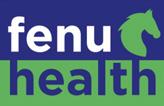
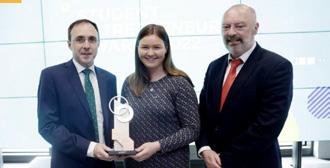
The Quercus Talented Students’ Programme is a UCC scholarship programme that supports and promotes excellence in academia, sport, creative and performing arts, active citizenship & innovation/entrepreneurship.
Alex Kendellen, CUBS Quercus scholar enrolled in the BSc Food Marketing and Entrepreneurship at Cork University Business School so that he could gain practical knowledge to help grow his family’s food business, Basil Market and Deli, when his rugby career comes to an end.
“I want to represent Ireland, that’s my longer-term rugby objective. The Quercus Talented Students’ Programme is designed to help me achieve that.”

Alex has established himself in the Munster squad having secured a senior contract ahead of the 2022/23 season. As a Quercus Scholar, Alex faces the challenge of striking a balance between his on-field ambitions and his desire to maximise his academic potential.
Supported by CUBS faculty and those involved in the Quercus Talented Students’ Programme, he is able to manage his time efficiently so that he can excel and deliver on his enormous potential.
Alex is currently developing the knowledge that could help catapult Basil Market and Deli onto the next level alongside his rugby career. His long-term aspiration to add value to sits comfortably alongside a burning desire to excel on the rugby field in the coming years.
“With my three brothers, I’d love to help bring our family run food market deli onto the national stage. That’s why I selected the BSc Food Marketing and Entrepreneurship.
I have always been interested in food business and the programme gives you the skills to be able to run one. ”

Nominated in the lifestyle category, Devon and Duc believe their innovative idea has the potential to revolutionise how content is published, distributed and consumed using NFT and blockchain technology.
“Our idea is relatively simple. We want to allow people to sell their e-books after they have read them. At the moment, there is no secondhand market for e-books. We think that you could create one by using NFT and blockchain technology so that people could sell on licenses to access individual e-books. We all associate the pre-owned book market with the buying and selling of physical books, but in that market, authors don’t receive any royalties and publishers also miss out on potential earnings.”
Devon and Duc won entrepreneurship competitions like the CUBS Business Idea Challenge and IGNITE’s Start-up Lab, which enabled them to iterate their idea and progress their concept. According to Duc, the next step on that journey is the Student Entrepreneurship Awards.
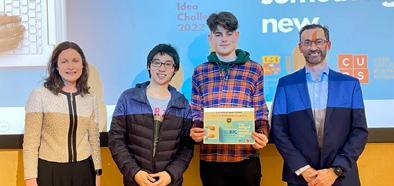
“Each competition that we have entered has acted as a stepping-stone for us to progress our idea. We used the feedback we received from the Ignite Start-up Lab Awards to help us with our application for the CUBS Business Idea Challenge. Entering those competitions allowed us to bring our idea forward and encouraged us to really think about what we were trying to achieve when we prepared our submission for Microsoft’s Imagine Cup. Although we didn’t win the competition, we got to see how other teams prepared and pitched their ideas.”
Having access to expert faculty at CUBS, along with being inducted into the IGNITE incubator programme at UCC, is helping Devon and Duc to progress their idea.
Devon also believes that being part of UCC’s start up ecosystem will expose them to a network of business professionals who can open doors and share insights that might otherwise lay beyond their reach.
“The IGNITE programme is enabling us to refine our concept and to start thinking about our business model and plan. It also gives us access to a network of like minded people who might take an interest in our idea and offer us some really good insight and advice.
If we are going to get our idea off the ground, we will have to leverage all the help and support that is available at UCC.”
In partnership with corporate organisations such as Carbery Group, FDC Group, KPMG and Glanbia, CUBS proudly offers scholarships to exceptional and promising students.
€12,500 each, along with a guaranteed placement opportunity within the FDC group.
The Jack Murphy Scholarship programme is aimed at students from the MSc in Co-operatives, AgriFood and Sustainable Development programme and the MSc in Management and Marketing programme. FDC Group developed the scholarship programme having been impressed by the contribution made by UCC students on placement within their company.
Congratulations to the latest recipients of scholarships, Fiona Barry, Dylan Lane, Amy McMahon and Siobhan O’Driscoll.
Global nutrition group Glanbia will help shape the future of food research in Ireland by partnering with UCC to fund two scholarships for students of the MSc Food Business and Innovation programme at UCC. The company will award two postgraduate scholarships annually for three years.

In 2021 Padraig Walsh was the first student to be awarded a Carbery Group Scholarship for the MSc in Co-operatives, Agri-Food and Sustainable Development programme at Cork University Business School, UCC.
Carbery Group has committed to supporting a postgraduate student scholarship at UCC for five years. The scholarship opportunity also includes a valuable work placement with Carbery Group.

LEFT TO RIGHT: RONAN O’FARRELL (MSC FBI PROGRAMME CO-DIRECTOR), MADELEINE O’CONNELL (GLANBIA SCHOLARSHIP RECIPIENT), STEVEN ATKINSON (GLANBIA SCHOLARSHIP RECIPIENT) AND PROFESSOR JOE BOGUE (MSC FBI PROGRAMME CO-DIRECTOR).
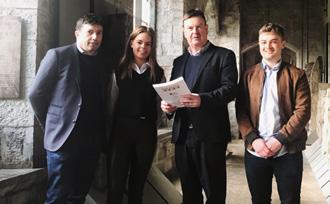
Irish accountancy firm, FDC Group, have collaborated with Cork University Business School to support a CUBS scholarship programme worth €250,000. The sponsorship is now in its fourth year and has provided 20 students with a scholarship of
The Glanbia scholars will focus on topics such as the challenges facing global food systems and the innovations that will help overcome them. To qualify for the scholarships, students must have applied for the MSc Food Business and Innovation programme, have received an offer, and accepted a place on the programme. The judging panel for the scholarships will include a representative from Glanbia along with representatives from UCC’s Department of Food Business and Development.
KPMG Outstanding Scholar Prizes were awarded to four exceptional BSc Accounting students. The prize includes a highly valued six month placement with KPMG.
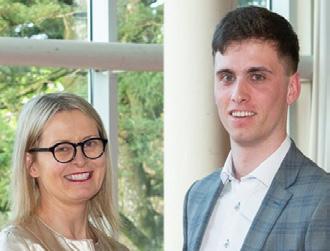
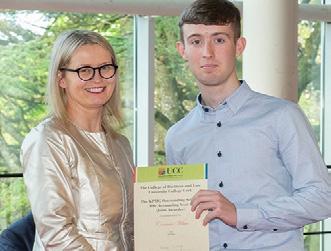
In 2021 the KPMG Outstanding Scholar Prizes were awarded to Emma Finn,
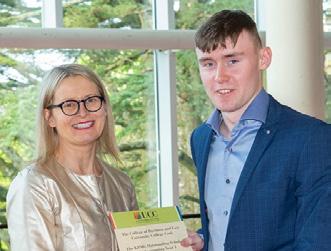
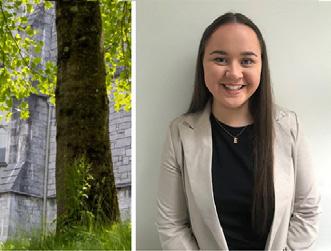
“In the role, I got to see how our course work is practically applied. I also got to work alongside people who were dealing with very different clients in the audit department … I couldn’t recommend the experience highly enough.”
Emma Finn“My placement with KPMG has been really helpful. Apart from the hands-on experience of working in the audit department, I was able to talk to my mentors and managers about the different paths toward becoming a chartered accountant.”
Kieran MurphyThe first Government of Ireland-National University of Ireland Post-Doctoral Fellowship in Rural Development was awarded to Dr. Lucas Olmedo under the mentorship of Dr. Mary O’Shaughnessy, Head of the Department of Food Business and Development at UCC.
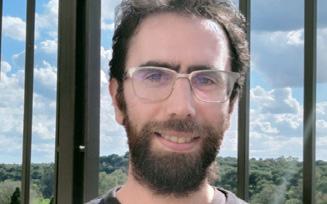
The Government of Ireland-NUI Post-Doctoral Fellowship, worth almost €120,000, is to encourage and support post-doctoral research in rural development and to advance the objectives of the National Rural Development Policy, Our Rural Future.
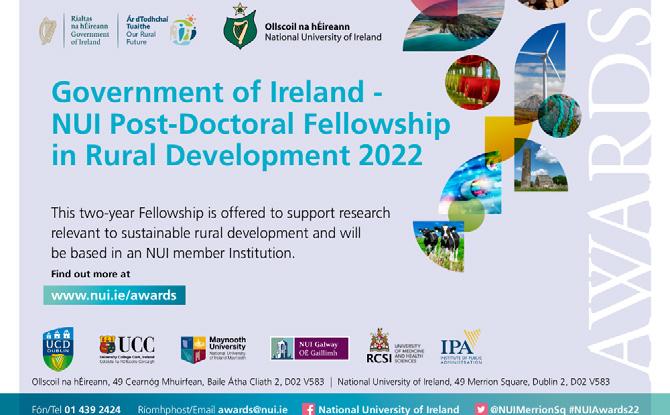
“The National University of Ireland is proud to partner with the Department of Community and Rural Development in continuing the University’s legacy in rural development.
Rigorous academic analysis of the ever-evolving social and economic conditions in Ireland, particularly since the global pandemic, is necessary for reliable and robust policy and the research funded by this Fellowship will expand our knowledge-base and contribute to the generation of vital national policies in the area of sustainable rural development.”
Dr. Maurice Manning, NUI ChancellorDr Olmedo’s research project, Mapping Social Enterprises and their Impact on Sustainable Rural Development in Ireland, has the aim of advancing research in the field of rural social enterprise by providing the first nationwide study on the relationship between these organisations and different types of rural areas and their impact on sustainable rural development.
The research will also generate an evidence base for the development of policy in rural social enterprises and sustainable regional and rural development.
CUBS is proud of its internationally acclaimed staff, with collaborations and impact reaching across the world. In the last year, there has also been an increased take up of academic papers on topical issues in the media, elevating the debate and understanding about critical issues facing society today.

Analysis: land-use and transport policies must be coordinated to make walking, cycling and taking the bus more competitive
By Dr Frank Crowley, Prof. Justin Doran, Dr Nóirin McCarthy and Conor O’DriscollCommute mode choice is the way we travel to and from work. Many factors influence this decision, such as age, financial circumstances, where we live and the availability of infrastructure.

Commuting to work is a staple trip in global households. Given the current climate crisis, it is important to implement policies which reduce unsustainable behaviours. One way to pursue this involves reducing car use for commuting by encouraging more walking, cycling and public transport use. Policymakers can achieve this by making these more competitive through the coordination of land-use and transport policies.
Our research focuses on the relationship between residential built environments and commute mode choices. We use data from the Irish 2016 Census for 1,299,821 people across 3,409 localities. Specifically, we are interested in whether specific land-use and development patterns influence the mode of travel people use when commuting.
We tested this relationship by incorporating variables which capture various built environment characteristics, such as land-use, population densities, and transport infrastructure provision.
We also capture the social circumstances of residential areas through measures like relative deprivation and property market values. The logic behind using these measures is that higher levels of deprivation signal an area underserved economically and socially, while higher property market values signal better local infrastructure quality.
Our key findings can be summarised in four key points:
• Mixed-use residential areas see greater public and active transport use when commuting.
• People living in relatively deprived areas walk and take the bus more than people living in relatively affluent areas.
• People living in areas with more roads use cars more when commuting.
• People living in areas with more public and active transport infrastructure generally only use these modes more if the infrastructure is high quality.
These findings hold significant implications for landuse and transport policies in Ireland. Our finding that mixed-use, compact residential environments directly encourage greater public and active travel provides firm support for the land-use development
objectives of Project Ireland 2040. Specifically, compact, mixed-use developments reduce the distances between residential areas and places of economic (i.e. jobs) and social (i.e., amenities) interest, thereby increasing the competitiveness and convenience attached to walking, cycling and taking the bus.
From a transport policy perspective, our finding that increases in road network provision consistently increases car use provides support for the popular mantra “if you build it, they will come”. However, our results suggest that simply building more infrastructure alone is not sufficient to encourage sustained increases in public transport use and active travel.
Specifically, we argue that increases in modespecific transport infrastructure provision may increase mode-specific use but will only do so consistently if this infrastructure is of high quality.
For instance, cycle lanes may not be used if they are unsafe. Similarly, the amount of bus stops available locally may not matter to users if the service is not good. This is intuitive and relates back to our previous results by highlighting how land-use and transport policies must be coordinated around making walking, cycling, and taking the bus more competitive if we are to see long-term shifts away from excessive car-use.
These results have direct implications for policymaking frameworks such as Cork’s Bus Connects, which plans to transform currently inefficient regional public and active travel services into competitive alternatives for car-use.
Specifically, their focus on creating segregated bus lanes will increase the competitiveness and convenience of buses by improving the quality of the infrastructure and service, directly encouraging greater bus-use.
The same logic applies to their intentions to incorporate active transport into these networks. Public and active transport are complimentary, in that most people must walk/cycle to bus stops, so a joint approach to infrastructure improvements is a robust approach to facilitate shifts in travel behaviours away from car-use.
Therefore, by focusing transport policies on multimodal accessibility and pairing these with land-use policies which prioritise compactness and mixeduse, you create a rising tide which boosts the convenience and competitiveness attached to all public and active transport modes. This facilitates shifts away from car-use and improves the efficiency and sustainability of regional developments.
RTE BRAINSTORM, 30 AUGUST 2022
 By Dr Bernadette Power, Dr Geraldine Ryan, Dr John Eakins, Ellen O’Connor and Dr Gordon Sirr
By Dr Bernadette Power, Dr Geraldine Ryan, Dr John Eakins, Ellen O’Connor and Dr Gordon Sirr
Citizen investment in wind farms could increase Ireland’s wind energy capacity and help us ensure the security of our energy supply by meeting the target of 80% renewable electricity by 2030. What’s more, there appears to be a real appetite among citizens to invest in local wind farms. In a national
survey last year, over two-thirds of respondents said they would consider investing in a local wind farm if given the opportunity. Almost half of respondents said an opportunity to buy shares in a wind farm would increase their willingness to agree to a turbine being located within 1km of their home.
At the moment, setting up a wholly communityowned project is the only real option available, such as the Templederry Community Windfarm in Tipperary, or the projects planned in the Aran Islands and Westmeath.
In Scotland’s Western Isles, projects like these have been found to generate, on average, 34 times more benefit for local communities than commercially operated projects. Even small, wholly communityowned projects can bring about considerable local benefits.
On the Scottish island of Westray, a single turbine operated by the Westray Development Trust produces nearly £300,000 per year for the local community. This money has been used to finance a fuel grant to help tackle fuel poverty in the community, the purchase of iPads and laptops for the local secondary school and even contributed towards the greenkeeper’s salary on the island’s golf course.
But while wholly community-owned wind farms can bring enormous benefits, such projects don’t come cheap, and that’s before you consider the risks associated with managing one. Raising the finance for a wholly community-owned project can easily run into millions, which presents a huge hurdle. Typical wind turbines, which range from about 1.5 to 3 megawatts in size, cost around €1.4 million per megawatt to install.
To alleviate this financial hurdle, Scottish communities are choosing to co-own wind farms alongside private developers, by acquiring either a stake in a project or a number of individual turbines.
A model also exists that allows communities to buy a share of the revenues from a project, without owning an actual shareholding, which means they can avoid many of the responsibilities and risks that come with co-owing a wind farm.
Of course, the financial challenges associated with developing wholly community-owned wind farms are not unique to Scotland. In our survey, we found that Irish people would only be willing or able to invest small amounts of capital in wind energy projects, which raises obvious concerns over their ability to raise sufficient finance for community ventures.
As such, co-ownership offers a more viable approach for communities to own a stake in a local wind farm, especially in large-scale projects. But such undertakings can still present operational challenges, especially for communities that lack the experience and expertise needed to manage a wind farm. Turbine failure, fluctuating wind speeds and the costs of repowering or decommissioning
turbines at the end of their lifetime are just some of the potential challenges.
The case of the Neilston wind farm in Scotland highlights both the difficulties and the benefits that can arise for communities involved in co-owned projects. In 2013, the local community established a four-turbine wind farm through a joint venture with Carbon Free Development Ltd., acquiring a 28% share in the project. Carbon Free took care of development, planning and construction, while it also helped the community to source the finance to buy its share of the project (£950,000 of the overall project capital expenditure of £15.6 million).
The project was initially viewed as a success, but problems emerged when the community faced difficulties repaying its loans due to variable incomes caused by a fall in energy prices and the UK Government cutting subsidies for onshore wind farms. Because of this, the community had to sell its share in the project in 2017 to the Renewables Infrastructure Group. Nevertheless, the community still netted a surplus of around £2 million from the sale, which was set aside for local initiatives such as supports for the elderly, upgrading local infrastructure and greenspaces and creating more facilities for youngsters.
Acknowledging the challenges that communities face in establishing and managing a wind farm, the Sustainable Energy Authority of Ireland (SEAI) is currently developing a Community Energy Resource Toolkit for onshore wind energy projects. This will support communities who wish to set up small-scale, wholly community-owned wind farms by providing them with practical guidance on technology, business and how to set up and manage a community organisation. A similar type of toolkit will need to be developed if communities are to invest in co-owned projects in the future.
Community ownership or co-ownership won’t eliminate our dependence on imported fossil fuels. But it could possibly be part of the solution to meeting our renewable electricity targets by providing a new source of capital, increasing public support for new wind farm developments and empowering citizens to participate in and benefit from our energy transition.
The Co-Wind project has received funding from Sustainable Energy Authority of Ireland (SEAI) under the SEAI Research, Development & Demonstration Funding Programme 2018, Grant number 18/RDD/281. The views and opinions expressed in this piece are the sole responsibility of the author(s) and do not necessarily reflect the views of the funders.
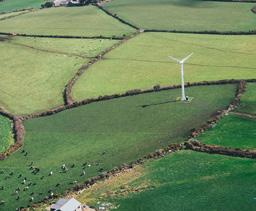

In Ireland, supporting business innovation is an important national priority. The new National Strategy on Research and Innovation, Impact 2030, identified innovation as a significant driver of enterprise success. Successive Irish governments have committed to investing in research centres, business incubators and accelerators, as well as business development support agencies.
As a result, Ireland compares very well on a variety of metrics, with the European Commission categorising Ireland as a ‘Strong Innovator’. Indeed, Irish innovation success stories are regularly publicised and celebrated.
However, innovation failures or abandoned projects receive far less attention. Approximately one in 10 Irish businesses abandon or suspend an innovation project, and this figure increases with firm size. We know very little about these failures in terms of decision processes or lessons learnt.
However, learning from failure is thought to be far more valuable than learning from success, and the
magnitude of failure significantly determines how well lessons will be learned.
Our Innovating in Ireland: Can We Fail Better? report provides an overview of key stakeholders’ perceptions of innovation failure and what failure means for individuals and businesses in an Irish context. Three insights from this report are discussed below: a fear of failure can lead to an emphasis on marginal improvements or incremental innovation; from start-up or scale-up female entrepreneurs face particular challenges; and the national eco-system must support radical, disruptive innovation to secure economic growth and meet critical societal challenges.
Fear of failure can have far-reaching consequences and can lead to an over-reliance on marginal improvements. Stakeholders at individual, firm and national level warned us that an environment which over-emphasises the importance of marginal improvements can hinder more radical and innovative ideas, ideas which are foundational to addressing complex societal issues, such as climate
change. Success can be seen and measured more easily for marginal improvements, as their impact is generally immediate and obvious, while there can be a legitimate fear of longshots failing due to their uncertain horizons, scope, and potential.
A fear of failure can also manifest itself in procurement decisions by large Irish public organisations and funding bodies. They are often more likely to purchase or fund innovations from large multinationals rather than an Irish start-up or SME. As a result, some Irish businesses develop two different business plans, one for the Irish market and one for US markets, with the Irish plan marketed towards more conservative procurement decision-makers.
This may be indicative of a national preference for targeting marginal improvements. An interesting suggestion from our study was to dedicate a proportion of public procurement to SMEs and startups, and thus potentially support more disruptive innovation.
Female entrepreneurs face specific challenges, particularly those juggling family and business commitments. Caring responsibilities create additional barriers-to-entry for female entrepreneurs and innovators. While the proportion of women in innovation and business has direct positive effects on economic growth, arising primarily by making greater use of the available talent pool to increase the relevance and quality of innovation outputs for society. Gender equality across society increases the collective intelligence when neither males nor females dominate.
Enterprise Ireland’s Action Plan for Women in Business prioritises increasing the participation of women in entrepreneurship and business leadership. While Ireland’s childcare crisis adversely impacts individual female entrepreneurs in reaching their potential, it also has far-reaching consequences for innovation, business success, job creation and economic growth in Ireland. For instance, Ireland’s gender gap is the highest for self-employment
in Europe. Increasing the number of female entrepreneurs and women-led start-ups will mean addressing broader societal issues such as childcare.

The national eco-system as described in Impact 2030 needs to be strong and competitive. In line with our report, Impact 2030 outlines that radical, disruptive innovation is the most likely solution to major societal issues, such as climate change and digital transformation. Reassuringly, Impact 2030 aims to broaden and deepen enterprise innovation capability, especially within indigenous SMEs.
In our report, concerns were raised that national and international funding strategies focusing on research prioritisation areas and ‘missions’ do not necessarily lend themselves to funding disruptive innovations. There is also a perception that longshot projects are being captured by established large companies and less ambitious research projects. While these projects may be beneficial in themselves, they may not meet the ambition of the original funding instrument.
In Ireland, job creation is, understandably, a key metric of success. However, an over-emphasis on job creation may potentially disadvantage start-ups where increasing their workforce is not necessarily a primary objective, such as unicorn start-ups. Furthermore, the report highlights how a focus on job creation may thwart radical innovation by potentially incentivising the pursuit of relatively low-hanging fruit and marginal improvements.
The Innovating in Ireland: Can We Fail Better? report points to the importance of cultivating a national innovation ecosystem which is not hampered by binary definitions of success and failure. This report is a first step in understanding innovation failure in Ireland, and how best to support learning from innovation failure at the individual, firm and national level. In the words of Samuel Beckett, “Ever tried. Ever failed. No matter. Try again. Fail again. Fail better.”
A longitudinal case study of 21 years of data by an international academic team led by Professor Thomas Lawton, CUBS, reveals how a fluid approach to parent-subsidiary management saved Lamborghini and could save other businesses.

In 1998, the Volkswagen Group, through its Audi division, acquired Lamborghini for about US$110 million, instigating changes that boosted manufacturing efficiency, mechanical reliability, and design innovation.
In 2021, it was reported that Audi/VW rejected an offer of €7.5 billion for the fabled supercar manufacturer. How did the German car giant turn around the fortunes of Lamborghini, which had changed hands five times in the preceding 35 years and was even declared bankrupt in 1978? More broadly, what’s the best way for a parent company to save a struggling acquired business? Research suggests that businesses should reject a one-sizefits-all approach and consider a more fluid strategy used by Audi AG to engage with Lamborghini.
Thomas Lawton, Professor of Strategy and International Business and Director of the Global Competitive Institute at CUBS, and colleagues at Emlyon Business School in France, Università di Bologna in Italy, and the University of Nottingham in the U.K., undertook a study which investigated 21 years of data.
The study concluded that it could be advantageous for parent organisations to vary the freedoms enjoyed by companies they buy – allowing higher
levels of organisational autonomy at some but not all times. In doing so, they can achieve, over time, the competitive Holy Grail of efficiency and innovation.
When Audi (a subsidiary of the Volkswagen Group) rescued the ailing Lamborghini in 1998, it followed the old parent company playbook by insisting that many Audi processes were implemented, including in manufacturing, procurement and quality control.
However, the research team noticed that the 2007 launch of the Lamborghini Aventador showed a reversal of this trend. Audi gave the smaller unit more autonomy and let it innovate in product design and development. The result was a hugely successful and iconic supercar.
Over the following 14 years, Professor Lawton and his team witnessed several more alternating divergences towards amalgamation and separation, occurring at the moment of product definition.
This unique organisational autonomy trajectory, and its reversals, have been a vital driver of the successful and impressive growth of Lamborghini over 20 years (40x increase in sales and a turnover of $1.33 billion during the first six months of 2022) and its essential contributions to Audi AG and VW
Group’s performance and strategy. Lamborghini’s turnaround has been phenomenal for a company that knew nothing other than red ink printed on the wrong side of the ledger.
Such impressive results and their causes cannot be explained by the current knowledge of organisational autonomy, acquisition integration, turnaround, organisational ambidexterity, or multinational management. But they can be defined by being open to a fluid, oscillating approach to autonomy, making sustained advantage possible for the parent and its business unit.
releases, social media content, media coverage and more. The study was enhanced by 77 interviews across multiple countries, incorporating the top management teams of Automobili Lamborghini in Italy, Audi AG in Germany, and external partners in the EU and the U.S.
This unrivalled access to top management and longitudinal design enabled the team to follow and track the post-acquisition dynamic evolution of Automobili Lamborghini’s organisational autonomy in its relationship with Audi AG and the mechanisms driving this trajectory.
Such longitudinal studies are rare due to the time commitment required and the need to access successive senior management of both the parent and business units. But they can reveal insights not available to other research methods.
By investigating what factors led to shifting levels of organisational autonomy at Lamborghini and how managers in both parts of the business bargained for power, the researchers created a new process model for the dynamics that determined the levels of freedom offered to a subsidiary by its parent. The model contributes fresh ideas to conversations about organisational autonomy and applies to merger and acquisition contexts and broader business settings involving subsidiaries.
Oscillating autonomy may provide superior solutions for managers facing many similar strategic issues. However, managing such a process is challenging, and the authors identify several vital mechanisms in their study that can be relevant for managers willing to follow the same perspective. Staying in what the authors call a “harmonic domain” allows longterm oscillations and benefits for the parent and its subsidiary unit. But the autonomy trajectory can drift if this domain stalls or becomes unsustainable. Therefore, managers must understand how this dynamic unfolds and how they can manage it. The team’s process model of autonomy dynamic provides the relevant guidelines.
The subsequent research, published in 2022 in the internationally acclaimed scientific journal, Administrative Science Quarterly, offers ideas and a process model for other companies seeking to balance efficiency-driven controls with effectiveness-oriented innovations successfully.
The research is based on a unique longitudinal case study spanning 21 years, with rich data from observations at facilities, and analysis of company documents, including presentations, sales figures, organisational charts, annual reports, press
Professor Lawton said: “This research offers businesses ideas for creating and maintaining competitive advantage and customer value when working with subsidiaries. Understanding how internal bargaining processes work makes it possible to use them to drive success. Parent companies should no longer assume the eventual objective after a merger or acquisition is either full amalgamation or separation. There’s a middle road offering a dynamic way forward.”
‘THE DYNAMICS OF ORGANIZATIONAL AUTONOMY: OSCILLATIONS AT AUTOMOBILI LAMBORGHINI.’ ADMINISTRATIVE SCIENCE QUARTERLY 67:3:2022.

LAWTON, T., DATTÉE, B., ARRÈGLE, J.L., BARBIERI, P., & ANGWIN, D.N., 2022.


CUBS staff and students have sustainability at the fore of their thinking. We are mindful of the need to adapt and change our lives to promote and drive sustainability. Our alumni are also taking that sustainability mindset into their workplaces.
In recent times, global and local events have shown that there can be no further delay in advancing sustainability initiatives if we are to manage and mitigate global warming. Below are some thought pieces on how the works of all those involved in CUBS is contributing to the sustainability debate in business.
As part of CUBS sustainable future, our vision of a stand-alone Business School, in the heart of Cork’s financial district, took a step closer with the appointment of a design team lead by architects RKD. UCC intends to conserve the historic 18/19 South Terrace as an integral part of the development and the design is based on active travel principles, with access primarily via public transport, cycling and walking.

The University’s aim for this project is to provide a building that delivers on zero or near zero carbon construction and operation. As part of our Net Zero Carbon 2030 (Operational) Target we are utilizing Air to Water Heat Pumps throughout as well as PV Panels on the roof and targeting a Renewable Energy Ratio greater than 20% for the site. It is a minimum requirement of the project that the design team deliver a BREEAM (Building Research Establishment Environmental Assessment Method) “excellent” building with the potential for exploring an “Outstanding” certification. The University is confident that many of the sustainability credits available will be achieved.
The building will thereby contribute to the ‘higher education quarter’, which will complement the existing cluster of education buildings in this part of Cork city, but not to its carbon footprint. There will be significant benefits for the city, regionally and nationally through this development and much time has been spent ensuring the development of a sustainable building that enhances the local area and the urban fabric of the city.

The proposed building design will extend to 15,675m2 and will provide an economic boost to the area by bringing 4,500 students and 225 staff into the city centre every day. The new building will have state of the art facilities, including a 350-seater
It is anticipated that a decision in respect of planning will issue in early March 2023, with construction commencing in 2024 so that CUBS may occupy the new facility in summer 2026 in advance of the commencement of the 2026/27 academic year.
For more than 70 years, Gross Domestic Product, or GDP, has been the key yardstick by which nations have measured economic progress. But GDP is designed to exclusively account for the monetary benefits accrued from economic activity. It is blind to the degradation of the natural environment, finite resources and human wellbeing. It’s time we came up with something better.
Without ever having to acknowledge how nature has contributed to economic growth, GDP has promoted unsustainable practices that have contributed to the climate and biodiversity emergencies. It has allowed us to vent greenhouse gasses into the atmosphere, destroy habitats and neglect human wellbeing without considering the consequences.
Of course, the current environmental disaster was something that the economist Simon Kuznets did not have to consider when he developed the concept in the aftermath of the Great Depression in the 1930s. But notwithstanding its limitations, something Kuznets was himself aware of, GDP has become the main economic indicator in use today. This puts policy makers who are trying to limit global warming in somewhat of a bind.
As such, we need to start looking at alternative metrics such as Gross Ecosystem Product (GEP) so that we can account for nature’s contribution to economic activity and human wellbeing.
Although research into calculating GEP is only in its infancy, it attempts to place a monetary value on things like clean water, soil quality, food security, healthcare and the culturally-significant landscapes that contribute to our happiness. In other words, GEP assigns a dollar value to the work of bees who act as nature’s pollinators, bogs that sequester carbon, and the stimulating effect nature has on our mental health.
While GDP looks exclusively at the value of production – or outputs – GEP instead places a value on nature’s input and incentivises policy makers to invest in nature. It would be naive to simply add both measures together and come up with an overall figure, since both metrics overlap in numerous areas. But the two measures can still provide decision makers with complementary information that could help allow for sustainable economic growth into the future.

For example, the Chinese government has been experimenting with the implementation of GEP in Qinghai province – a remote region of the Tibetan plateau that contains the source of the Mekong, Yangtze and Yellow Rivers.

There, researchers found that GEP was far greater than GDP in the year 2000, 81.5 vs. 26 billion Yuan. At that point, there was considerably more useful ecosystem activity than human economic activity.
However, by 2015 GEP had shrunk to three quarters the size of GDP, 185.4 vs. 242 billion Yuan. This suggests greater investment had been made in traditional economic growth at the expense of the environment. Intriguingly, as Qinghai is the source of three major rivers, the study also found that the province “exports” ecosystem services like drinking
water and fertilising nutrients, which show up in the GEP accumulated by other Chinese provinces and neighbouring countries.
The ability to measure the value of Qinghai’s ecosystem “export” could set in train a process whereby financial compensation is paid to the province by neighbouring regions.
Such a programme could create the economic incentive for communities to conserve and grow ecosystem assets. To put this in a global perspective, imagine if Brazilian farmers were paid by European countries to manage the rainforest based on the amount of carbon it sequesters.
Similarly, in Ireland, GEP would allow bogs and woodlands to contribute to the economy. In such a scenario, Irish cities could be compelled to pay rural regions to store some of the carbon they produce or to maintain culturally significant landscapes that

enhance mental health and wellbeing.
By placing a value on the benefits that we derive from our natural environment, GEP would also encourage us to think differently about how we manage, maintain and grow those regions that have been neglected in favour of centralised growth strategies.
However, for now at least, it would be impractical to implement a system like GEP or the UN’s System of Environmental-Economic Accounting. Apart from being hugely complex and largely unproven, adopting it would require a global economic consensus on a scale not seen since the international financial order was devised after the second world war.
Nevertheless, if we are to manage the complex trade-offs needed to mitigate the climate crisis, then radical new thinking is required.
Ireland needs to reimagine its economy to face the challenges posed by climate change. Is there an appetite among indigenous financiers to invest in renewables?
There is a huge appetite among both indigenous and international investors. The challenge is finding the projects that will generate a return for both the planet and investors.
I think everybody in the financial services industry is aware of the potential around green investments, but they have big concerns around things like green washing. Investors are also worried about enabling companies that are living off the back of sustainability rather than contributing to it.
Separating the two can be difficult given how pervasive sustainability has become in business. When I was in college, for example, I studied environmental economics, which was thought to be a fringe subject at the time, but today its mainstream. For today’s students, this means that they’ll need
to understand how the major issues around climate change and sustainability intersect with finance. That’s how they’ll position themselves in the jobs market. I landed my first job in the dairy industry because I learned about milk quotas at UCC. That same logic applies today, it just happens to be in the industry of sustainability.
Do we have the talent in this country to develop the solutions that will maximise the opportunities presented by sustainability?
Most definitely. Our universities are producing graduates that are up there with the best in the world. When you think about how enterprise, entrepreneurship, innovation and the free markets are being mobilised to drive solutions you get reminded of the amount of talent that is out there.
You also have to realise that it isn’t all about capital either. It’s about being positive around engaging with the challenges that we face. We need to encourage people and be constructively positive
so that we don’t get depressed and surrender to the narrative that little can be done. That narrative is certainly out there at the minute, and we need to resist it.
If the capital is there to drive sustainable change, what policy framework is needed to help mobilise the talent that is out there?
Money can dictate an awful lot. If we can ask questions about how that capital is being spent, in terms of how it supports sustainability and measures that limit climate change, that will have a very direct bearing on how businesses invest, and how investors behave.
In the United States, for example, there is a cohort who don’t believe that they need to regulate or oversee the financial services industry to support sustainable change.
Thankfully, in Europe, the situation is somewhat different, where the European Central Bank, Commission and Council are all clearly signally that they want the financial system to act as a gatekeeper around sustainability.
For business, it means that if you want to come to the banking system in Europe with a project that is dirty or polluting, you’re either going to pay more for capital or you’re not going to get it at all.
Conversely, if you bring forward a project that constructively combats climate change or promotes sustainability, you’re either going to be able to access capital at reduced rates or get access to a lot of it. This carrot and stick approach is the new reality for many companies out there, and I think it will work.
You seem very confident about our ability to drive sustainable change, what is driving your positivity?
We have already shown a capacity to change our climate and environment. The planet is warming up and we have contributed to that process. So, what we need to do is trust the ingenuity of the people who can reverse or slacken it.

I don’t mean that we put our futures in the hands of people who promote Malthusian economics. That’s a racist Victorian ideology that would deny people living in the Third World the opportunities that we have had for much of the last century.
Instead, I think that we have the ability to change the way that we farm, consume and use transport.

As I said, the capacity for change already exists. Fifty years ago, the best authorities in Irish agriculture were telling farmers like my father-in-law to remove hedges and to use mono grass on their land to maximise production.
As a result of following that expert guidance, the biodiversity on his farm reduced very quickly. We have reversed all that in the last five years by installing things like new hedges on the farm.
If we can do that as a family at a very micro level, imagine what you can do at a European level through CAP.
We just need a carrot at CAP level to incentivise biodiversity. If we did that, we could transform the agricultural industry relatively quickly. The same can be said in other areas.
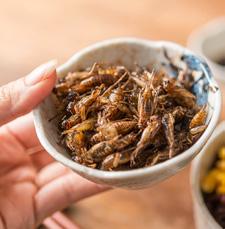
MSc Food Business and Innovation student identifies exciting new sustainable food business idea in CUBS
Sancho Criado del Rey, an MSc in Food Business and Innovation (MScFBI) student at Cork University Business School (CUBS), has been further developing an exciting new sustainable food business idea that he commenced while studying food entrepreneurship and innovation on the MScFBI programme at CUBS in 2021/2022.
A budding food entrepreneur, Sancho has researched his new business idea during his master’s programme and is now further developing the idea that could see him harvest insects to be integrated into food products, like protein shakes or sauces. He has used the theory and the practical skills he acquired while studying the MScFBI programme to develop his idea.



Mojabeng Mashale, an MSc Co-operative, Agri-Food and Sustainable Development student, explored the role of food retailers in supporting Prepared Consumer Food SMEs to implement sustainability in their businesses.
Based on interviews with a small sample of SMEs and retailers, the study highlighted the potential for different actors in the supply chain to collaborate to identify commonly shared sustainability goals and develop the required knowledge and skills to achieve these goals.
Through the work of Sancho, Mojabeng and other students like them, CUBS is increasing its role in the food business and innovation space. In May 2022, this included hosting an inaugural Food and Beverage Conference in association with Goodbody.

The conference included leaders from companies with a combined turnover of more than €140 billion, including Heineken, Musgraves, Tesco, Kerry Group, Boormalt, Foresight, Yield Lab, AIB, KPMG, Tate and Lyle, SHS Inc, Origin Enterprises, Zespri, Goodbody, Keelings, C&C Group and IDL Pernod Ricard addressed the near 100-person audience on investing in sustainable production, distribution and retailing of food and beverages.
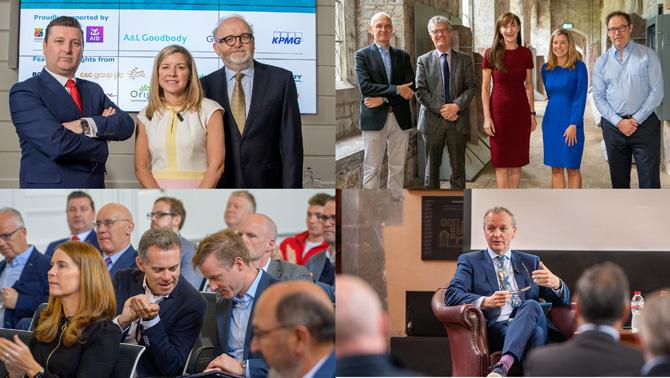
One of the key challenges of the sector is that despite consumer demand for sustainably produced food and beverages, surveys show consumers are not prepared to pay more for sustainable products. Other concerns raised were related to waste and recycling infrastructure for the enablement of a more circular economy in Ireland.
Given that climate action is a critical requirement, to meet Ireland’s legally binding climate action targets of reducing greenhouse gas emissions by 51% by 2030 and reaching net-zero emissions by 2050, with Industry and Enterprise targets of 29-41% by 2030, a focus on working collaboratively with all stakeholders in the food and beverage supply chain is critical.
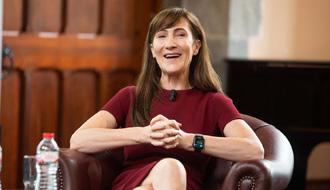
The food and beverage industry faces a lot of change, challenges, and opportunities. The conference concluded with remarks from panellists who shared that extensive consumer education about the true cost of sustainably produced food is required. Furthermore, while there is progress in
the industry on the implementation of sustainability, there is a need to move from “business and sustainability” to “sustainable business”.
CAROLINE KEELING, CEO OF KEELINGS, AT THE FOOD AND BEVERAGE CONFERENCE, OUTLINING
THEIR SUSTAINABILITY PLAN AS IRELAND’S LARGEST PRODUCER AND SUPPLIER OF FRESH FRUIT, WHO HAVE KEY AREAS OF ENERGY, EMISSIONS, WASTE, WATER, RAW MATERIAL SOURCING, FOOD SAFETY AND NUTRITION, AND EMPLOYEE WELFARE AS KEY ASPECTS OF THEIR SUSTAINABILITY PLAN.

That brings us to the end of the CUBS highlights for 2022. We hope you have enjoyed an insight into a selection of our staff and students’ achievements as we emerged from the pandemic.
The year ahead will undoubtedly hold its challenges, with ongoing regional conflict, rising inflation rates and cost-of-living crisis, and global market instability impacting everyone. These challenges continue to remind us of the need for sustainable strategic analysis and ethical leadership to navigate uncertainty and volatility and forge new opportunities for the future.
Together with our colleagues in the Irish Management Institute (IMI), our goal is to prepare the leaders of today and tomorrow to take up these challenges and to proactively engage on national, European, and world stages.

That preparation requires us to be agile and adaptive as economies and societies change and the nature of education and learning progresses. CUBS evolves alongside the business world, ensuring our continued relevance and contribution to competitive advantage.
Once again, please do not hesitate to reach out to us in the coming year. We welcome collaboration, innovation, and diverse thinking amongst our staff, students and partners.
Wishing you every success in 2023.
CUBS staff continue to forge international relationships and undertake ground-breaking research with colleagues locally and worldwide.
On the following pages we have listed some of the published highlights from 2021-2022.

Andrew, C., Sherman, M. O’ Sullivan, N., Gao, J. Zhu, S. ‘Manager characteristics: Predicting fund performance’, International Review of Financial Analysis, vol. 80. doi.org/10.1016/j.irfa.2022.102049 Jan. 2022 https://www.sciencedirect.com/ science/article/pii/S1057521922000266 3*
Dattée, B., Arrègle, J-L, Barbieri, P., Lawton, T.C., Angwin, D.N. ‘The Dynamics of organizational autonomy: Oscillations at Automobili Lamborghini’, Administrative Science Quarterly 67:3 2022 https://journals.sagepub.com/doi/ full/10.1177/00018392221091850 (AJG 4*)
(Accepted on) 1th January 2022 4*
Atkins, J. F., Atkins, B., Maroun, W., Barone, E. & Gozman, D. ‘Conservation through conversation? Therapeutic engagement on biodiversity and extinction between NGOs and companies’, Business Strategy and the Environment, 1–17. Sept. 2022 https://onlinelibrary.wiley.com/doi/10.1002/ bse.3144 3*
Bandalouski, A. M., Egorova, N. G., Kovalyova, M. Y., Pesch, E., Tarim, S.A., ‘Dynamic Pricing with Demand Disaggregation for Hotel Revenue Management’, Journal of Heuristics, 27, pp. 869–885, doi.org/10.1007/s10732-021-09480-2 2021 https:// econpapers.repec.org/article/sprjoheur/v_3 a27_3ay_3a2021_3ai_3a5_3ad_3a10.1007_5 fs10732-021-09480-2.htm 3*
Butler, D. Butler, R. ‘The evolution of the football jersey - an institutional perspectives’, Journal of Institutional Economics 17(5):821-35 Apr. 2021 https://doi.org/10.1017/S1744137421000278 3*
Carr, Michelle, Beck, Matthias ‘Accounting practices and professional power dynamics during a crisis’, British Accounting Review May-22 https://doi. org/10.1016/j.bar.2022.101085 3*
Chen, Y.,Goyal, A., Zolotoy, L. ‘Global board reforms and the pricing of IPOs’, Journal of Financial & Quantitative Analysis 57:6 https://www.cambridge. org/core/journals/journal-of-financial-andquantitative-analysis/article/abs/global-boardreforms-and-the-pricing-of-ipos/938E04D74703 C0987AC83265AFB26FC7 4*
Crowley, F. Doran, J., & McCann, P. ‘The vulnerability of European regional labour markets to job automation: the role of agglomeration externalities’, Regional Studies, 55(10-11), 1711-1723. Jun. 2021 https://doi.org/10.1080/00343404.2021.1928041 4*
Duddy, C. Piggins, A. ‘Collective choice rules with social maximality’, Journal of Mathematical Economics, 99. DOI: 10.1016/j. jmateco.2021.1026152022 3*
Duggan, J., Sherman, U., Carbery, R., McDonnell, A. ‘Boundaryless Careers and Algorithmic Constraints in the Gig Economy’, The International Journal of Human Resource Management Jun. 2021 https:// www.tandfonline.com/doi/full/10.1080/09585192 .2021.1953565 3*
Duanmu, J., Lawton, T.C. ‘Foreign buyout of international equity joint ventures in China: When does performance improve?’, Journal of World Business 56:5 2021 https://www.sciencedirect.com/science/article/pii/S1090951621000559?via%3Dihub 4*
Duong, H.N., Goyal, A., Kallinterakis, V. and Veeraraghavan, M. ‘Democracy and the pricing of initial public offerings around the world’, Journal of Financial Economics 145:1 2022 https:// www.sciencedirect.com/science/article/pii/ S0304405X21003342 4**
Eze, E., Gleasure, R., Heavin, C. ‘Worlds apart: a sociomaterial exploration of mHealth in rural areas of developing countries’, Information Technology & People, Vol. 35 No. 8, pp.99-141 Jan. 2022 https:// doi.org/10.1108/ITP-04-2020-0228 3
Garavan, T.N, McCarthy, A., Lai, Y., Clarke, N., Carbery, R., Gubbins, C., Sheehan, M., Saunders, M. ‘Putting the System back into training and firm performance research: A Review and Research Agenda’, Human Resource Management Journal 2021 https://onlinelibrary.wiley.com/doi/ full/10.1111/1748-8583.12337 4*
Gurkan, E., Tunc, H., Tarim, S.A., ‘The joint stochastic lot sizing and pricing problem’, Omega, 108, #102577, doi.org/10.1016/j.omega.2021.102577 Apr. 2022 https://www.sciencedirect.com/science/ article/pii/S0305048321001869?via%3Dihub 3*
Hickey, C., O’ Brien, J., Caldecott, B., McInerney, C. Ó Gallachóir, B. ‘Can European electric utilities manage asset impairments arising from net zero carbon targets?’, Journal of Corporate Finance 70, 102075 https://www.sciencedirect.com/science/article/ pii/S0929119921001978?via%3Dihub 4*
Hutchinson, M.C. Nguyen, Q. M. N. Mulcahy, M. ‘Private hedge fund firms’ incentives and performance: Evidence from audited filings’, European Journal of Finance https://www. tandfonline.com/doi/full/10.1080/135184 7X.2021.1954966 3*
Jooss, S., Conroy, K., McDonnell, A. ‘Discretion as a double-edged sword in global work: The perils of international business travel’, Human Resource Management Journal, 32(3):664-682 Nov. 2021 https://onlinelibrary.wiley.com/doi/ full/10.1111/1748-8583.12420 4*
Kenny, S. Ögren, A. ‘Unlimiting Unlimited Liability: Legal Equality for Swedish Banks with Alternative Shareholder Liability Regimes’, 1897–1903. Business History Review, 95(2), 193-218. Jun. 2021 https://doi. org/10.1017/S0007680521000192 4*
Mahony, C., Heavin, C,. Sammon, D. ‘Identifying design guidelines for online information resources: a study of expectant and new mothers’, Information Technology & People, Vol. 35 No. 8, pp. 23-51 May. 2022 https://doi.org/10.1108/ITP-04-2020-0180 3*
Mbaylohere, C., Lawton, T.C. ‘Engaging informal institutions through corporate political activity: Capabilities for subnational embeddedness in emerging economies’, International Business Review, 31 (2) 2021 https://www. sciencedirect.com/science/article/pii/ S0969593121001451?via%3Dihub 3*
McCarthy, S. O’Raghallaigh, P., Fitzgerald, C., & Adam, F. ‘Shared and fragmented understandings in interorganizational IT project teams: An interpretive case study’, International Journal of Project Management, 39(7), 762-773. Jul. 2021 https:// www.sciencedirect.com/science/article/pii/ S0263786321000788
McDonnell, A. Carbery, R. Burgess, J Sherman, U. ‘Technologically mediated human resource management in the gig economy’, The International Journal of Human Resource Management Sept. 2021 https://doi.org/10.1080/09585192.2021.1986109 3*
McDonnell, A., Skuza, A, Jooss, S., Scullion, H. ‘Tensions in talent identification: A multistakeholder perspective’, The International Journal of Human Resource Management Aug. 2021 https://www. tandfonline.com/doi/full/10.1080/09585192.2021 .1976245 3*
McElroy, B. Eve Griffin, et al. ‘Evaluation of the impact and implementation of a national clinical programme for the management of self-harm in hospital emergency departments: study protocol for a natural experiment’, British Journal of Medicine (Open) Dec. 2021 https://bmjopen.bmj.com/ content/11/12/e055962
McLaughlin, E. Pecchenino, R. ‘Financial Inclusion with Hybrid Organizational Forms: Microfinance, Philanthropy, and the Poor Law in Ireland, c. 18361845’, Enterprise & Society, Volume 23 , Issue 2 , June 2022 , pp. 548 – 581, DOI: https://doi. org/10.1017/eso.2020.67 3*
Grodecka-Messi, A., Kenny, S. and Ögren, A. ‘Predictors of bank distress: The 1907 crisis in Sweden’, Explorations in Economic History, Volume 80. April 2021. Apr. 2021 https:// www.sciencedirect.com/science/article/pii/ S0014498320300826?via%3Dihu b 3*
Gummerus, J., O’Loughlin, D., Kelleher, C. and Peñaloza, L. ‘Shifting sands: Actor role and identity reconfigurations in service systems’, Journal of Business Research, 137, pp.162-169. Aug. 2021 https://doi.org/10.1016/j.jbusres.2021.08.001 3*
McCarthy, S., Rowan, W., Kahma, N., Lynch, L., & Ertiö, T. P. ‘Open e-learning platforms and the design-reality gap: an affordance theory perspective’, Information Technology & People 35(8) Oct. 2021 https://doi.org/10.1108/itp-06-2021-0501 3*
McLaughlin, E., Pecchenino R. ‘Fringe banking and financialization: Pawnbroking in pre-famine and famine Ireland’, Economic History Review, Volume75, Issue3, August 2022, pp. 903-931 https:// onlinelibrary.wiley.com/doi/10.1111/ehr.13132 4*
Mercille, J. , Lucey, D. S., Turner, B. ‘Ireland’s takeover of private hospitals during the COVID-19 pandemic’, Health Economics, Policy and Law, 17 (2). May. 2021 https://doi.org/10.1017/S1744133121000189
Roper, S., Bourke, J. ‘Innovating into trouble: When innovation leads to customer complaints’, Research Policy 51: 104593. Dec. 2022 https://doi. org/10.1016/j.respol.2022.104593 4*
Moazzam, A., Usman, M., Shafique, I., Garavan, T.N., Muavia, M. ‘Fuelling the Spirit of Care to Surmount Hazing: Foregrounding the Role of Spiritual Leadership in Inhibiting Hazing in Hospitality Context’, International Journal of Contemporary Hospitality Management 2022 Doi.10.1108/IJCHM-09-2021-1087 https://www. emerald.com/insight/content/doi/10.1108/ IJCHM-09-2021-1087/full/html 3*
Mulligan, K., Lenihan, H., Doran, J., Roper, S. ‘Harnessing the science base: Results from a national programme using publicly-funded research centres to reshape firms’ R&D Research Policy’, 51(4), 104468 2022 https://www.sciencedirect.com/ science/article/pii/S0048733321002602 4*
Noonan, L. ‘The role of culture as a determinant of tourism demand: evidence from European cities. International Journal of Tourism Cities’, https:// www.emerald.com/insight/content/doi/10.1108/ IJTC-07-2021-0154/full/html Scimago Q1 ranked journal in the category of Geography, Planning and Development
Olmedo, L., van Twuijver, M., O’ Shaughnessy, M. ‘Rurality as context for innovative responses to social challenges - The role of rural social enterprises’, Journal of Rural Studies [online] May. 2021 https:// doi.org/10.1016/j.jrurstud.2021.04.020 3*
Perez-Alaniz, M., Lenihan, H., Doran, J. & HewittDundas, N. ‘Financial resources for research and innovation in small and larger firms: Is it a case of the more you have, the more you do?’, Industry and Innovation, 1-44. 2022
https://www.tandfonline. com/doi/full/10.1080/13662716.2022.2036597 3*
Rijnks, R. H., Crowley, F. Doran, J. ‘Regional variations in automation job risk and labour market thickness to agricultural employment’, Journal of Rural Studies, 91, 10-23. 2022 https://www.sciencedirect. com/science/article/pii/S0743016721003739 3*
Sheehan, M., Garavan, T.G., Morley, M. ‘The Microfoundations of Dynamic Capabilities for Incremental and Radical Innovation in Knowledge Intensive Businesses’, British Journal of Management 2021 doi.10.1111/1467-8551.12582 https://onlinelibrary.wiley.com/doi/10.1111/14678551.12582 4*
Sherrin, C., Garavan T.N. ‘Female leaders as ‘Superwomen’: Post Global financial crisis media framing of women and leadership in Investment Banking’, Critical Perspectives on Accounting 2021 https://www.sciencedirect.com/science/article/pii/ S1045235421000265 3*
Tjandra, T.N., Garavan, T.N., Aroean, L. Prabandari, Y, ‘Understanding the ethical legitimacy of tobacco advertising, promotion, and sponsorship in Indonesia in the context of increased government regulation: A legitimacy-as-perception perspective’, European Journal of Marketing 2022 https://cora.ucc.ie/ handle/10468/13356 3*